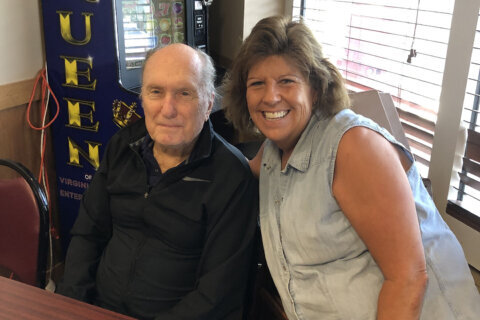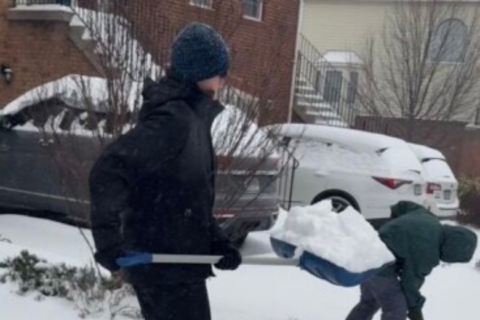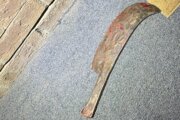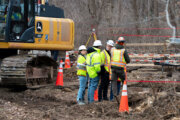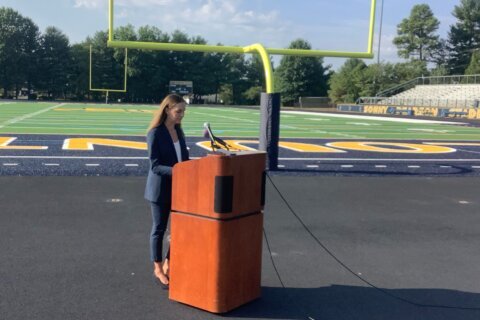
Every high school athlete in Loudoun County Public Schools will be provided with a free baseline concussion test, which could provide doctors valuable information if a student suffers a head injury.
The partnership with Inova Sports Medicine Concussion Program was announced by LCPS Assistant Athletic Director Derek Farrey, in a news conference on the sidelines of the football field at Loudoun County High School on Thursday.
“All 14,000 of our student athletes will be given a free neurocognitive baseline test prior to activities with the goal of improving concussion management, for the student athletes of LCPS,” said Farrey. “The testing will be provided at no cost to families and is the first of a kind program in this area.”
In addition to contact sports (including football, soccer and baseball), Dr. Melissa Womble, the director of the Inova concussion program said the partnership will include “for the first time ever, noncontact athletes in sports such as cross country, who are also susceptible to concussions.”
“The data from these preseason assessments will go a long way in helping my team and I provide individualized and targeted treatment and management for student athletes that may sustain a concussion,” said Womble.
How baseline concussion testing is done
The data-gathering is totally noninvasive.
“The testing is all done on the computer — it’s a test that takes about 20 to 30 minutes depending on the child’s speed,” said Womble. It can be administered in a computer lab, or at the student’s home, in a quiet location, under a parent’s supervision.
“It looks at verbal memory, visual memory, processing speed and reaction time,” said Womble. “Those are the areas of cognitive functioning that can be affected, post-concussion.”
Having access to a baseline test will be an extra tool in determining if an athlete has returned to their baseline, after a head injury.
“What we see sometimes is the cognitive piece can be the last to fully resolve with concussion,” said Womble. “A lot of times the physical symptoms — the headaches, the dizziness — they get back to normal sooner.”
Womble said there’s no single way to best identify and treat concussions.
“Not every concussion is the same,” she said. “We may see student athletes with more vestibular presentations post-concussion where they’re having more dizziness,” which would suggest vestibular rehabilitation therapy — an exercise-based program to reduce dizziness.
On the other hand, “some patients need simple behavioral regulation, getting them back to activities, getting them on a good schedule with diet and hydration and sleep.”
Womble said a common treatment suggested after a head injury has proven to be counterproductive: “We’ve really moved away from rest as a treatment. Research has shown us the sooner we can get kids back to school and back to physical activity, the better they do.”
LCPS athletic trainers will be part of the treatment referral team, given their proximity and knowledge of the school student athletes.
Asked to opine on the health and head-injury risks student athletes face, Womble said all teenagers — including non-athletes — face risks, including drug use, and that participating in sports offers a positive outlet to young people.
“All in all, the benefits outweigh the risks,” said Womble “So, what we want to make sure is that athlete is fully 100% back to normal before we put them back on the field.”
The LCPS program is in effect for the 2023-2024 school year.



